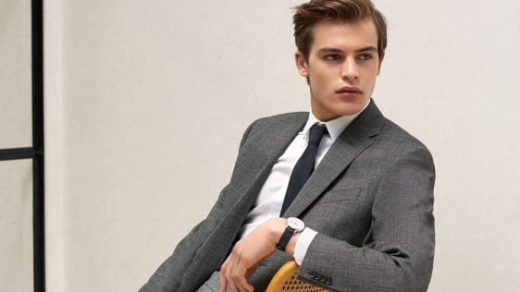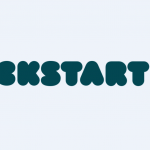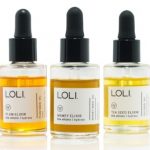Meet Linjer, The Most Popular Leather Goods Startup You’ve Never Heard Of
Linjer, an under-the-radar brand known primarily to people obsessed with minimalistic design, has generated $10 million after just three years of being in business. Founded by San Francisco entrepreneurs Jennifer Chong and Roman Khan, the brand has managed to cultivate a cult following of online fans who are willing to crowdfund their latest leather watch and bag designs, then wait months for them to make these products.
Back in 2014, the cofounders were tinkering with the idea of creating a soft briefcase made of high-quality leather, largely because they couldn’t find anything like it on the market. Rather than just making the product and launching a brand, they decided to figure out whether there really was a market for such a product. So they went to StyleForum, a Reddit-like platform that attracts men who want to discuss certain products, but may not have the types of friends who share their passion.
“These are people who will get really nerdy when it comes to products,” Khan says. “There were long discussions about what kinds of zippers are better than others. It was the perfect focus group for us as we were thinking about starting our business.”
It turned out other men were looking for a structured bag to bring to work that was well-crafted enough to last years, but didn’t cost thousands of dollars. Chong and Khan took careful note about what these men were looking for, considering factors like the thickness of the straps, the color of the hardware, and the items they would be toting around on a regular basis. Then, they went out to find the high-quality vegetable-tanned leather–which is of higher quality and patinas over time–and an Italian workshop that would make it. They determined they could make a luxury-quality bag for $489.
Chong and Khan went back to the men on StyleForum, asking them to crowdfund their Indiegogo campaign to make the soft briefcase. Hundreds of men from 70 different countries signed up immediately. In the first 60 hours, they managed to generate $140,000 in sales. Looking back, Khan believes this was the best way to launch the company because it allowed the founders not to take any outside investment, so they could focus on designing their ideal product without any outside interference.
“It allowed us to stay bootstrapped because we could make the right inventory decisions, so we’re not buying a thousand of the wrong color,” he says. “It allowed us to understand our demand before we put money behind it.”
Obsessed With Little Details
When they were working on this very first briefcase, Chong became fixated with the edges of the bag. On most soft leather bags, there is a thick, bulging seam around the edge, but Chong worked with an Italian craftsman who had a technique of sewing the leather in such a way that created a cleaner look. “It’s definitely not an efficient way to make a product,” Chong says. “But we did not feel any pressure to make this cheaply or fast.”
This is just one example of the founders’ obsession with little details. They don’t describe themselves as a fashion brand, but rather as a “design studio.” The name Linjer is a Norwegian word that means “lines,” which they felt was appropriate given their focus on minimalist design. Once it became clear they had a strong business idea, they moved to Florence so that they could oversee each step of the production as closely as possible.
When the bag finally came out, customers responded with glowing feedback. The bag received stellar reviews from The Wirecutter, and it became clear there was a demand for more products. Over the last three years, Chong and Khan have created dozens of other products using the same meticulous approach to the design and the same method of crowdfunding. They now have a series of watches, bags of various silhouettes, and a range of wallets and card holders.
But thanks to their strategy of tapping into very specific audiences of people interested in minimalistic design and high quality, the brand has managed to remain largely underground. Some of its newest products are designed with women in mind. It recently released the $425 “Tulip” bag, which had a 2,500-person waitlist and $600,000 in pre-sales on Indiegogo. The bag is a play on the bucket bag: It has more structure than many bags on the market, but the inside is made of soft linen that is actually far roomier than it appears at first.
Linjer is also about to launch a slim women’s watch called the Petite, which, at 30mm, is smaller than any other launches in the brand’s portfolio. It will also roll out two new watches for men: The Chronograph, which features a 30-minute counter and 12-hour counter, and has a sportier look, and the Automatic, which has automatic movement and is the company’s most expensive watch yet. All of these watches are being pre-sold on Kickstarter at an early bird discount, and they have already raised $735,000.
Linjer’s success and growing customer base will mean losing its identity as a small, underground player in the world of direct-to-consumer luxury fashion. Chong and Khan find this bittersweet, in a way, because part of the excitement around the brand thus far has been that customers feel like they are discovering a hidden gem that no one else knows about. But they are also thrilled about their growth. They’ve recently hired three customer service representatives and will no longer use crowdfunding to launch new products starting next year.
Nonetheless, Chong says that the couple will continue to focus on their mission, which is to create the best-quality products they can possibly make. “Our goal is to make it easier for people to own luxury quality products without paying outrageous prices,” she says. “We’re going to stay focused on the materials and craftsmanship.”
Fast Company , Read Full Story
(62)














